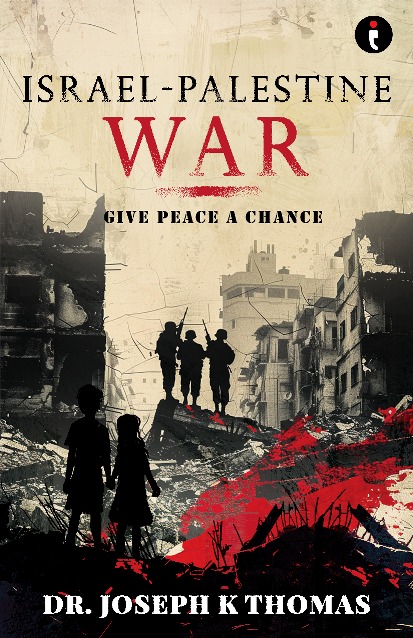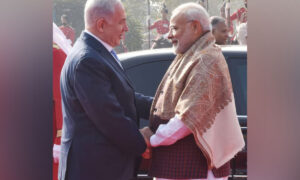
A deeply researched and nuanced book on the ongoing Israel-Palestine discord by an army veteran called Israel-Palestine War: Give Peace a Chance by Dr. Joseph K. Thomas, offers a comprehensive analysis of one of the most complex and the oldest conflicts still affecting the world. The book provides a comprehensive overview, from the Balfour Declaration to the dramatic events of the October 2023 invasion, presenting a layered portrait of how this is impacting the world right from the diplomatic impasse to the environment, economic and health crisis it brings with it.
Peering into the future, the book probes prospects for peace, drawing insights from historical endeavours and offering a roadmap for reconciliation in this deeply fractured region. This is the time to rewrite history, to heal the wounds of the past, and to build a legacy of peace.
INTRODUCTION
“In the Middle East, the past is never dead. It’s not even past.” Borrowing from the immortal words of William Faulkner, this sentiment rings truer in the cradle of ancient civilizations than perhaps anywhere else on earth. It is here that history breathes in the winds, that every stone tells a story of faith, of struggle, of the unyielding yearning for a place to call home. What does it mean when the very land you stand on, is steeped in centuries of blood and belief, where every line in the soil has been turned by the toil of competing narratives? The Israeli-Palestinian war is not just the story of two peoples and the land they both claim, but an entanglement of historical, religious, and cultural complexities that has resisted untangling for generations.
The land, sacred to many, has been a crucible of civilization, a battleground for empires, and a fabric of cultures for millennia. A journey back through the corridors of time brings us to the birthplace of the three great monotheistic religions, each laying claim to this sliver of earth, a claim that has sparked countless conflicts and shaped the destinies of nations.
“In order to understand the geography of a place, one must first understand its history.” Avi Shlaim, a renowned historian, encapsulates the essence of the land, that is both ancient and painfully current. This land, where olive trees have witnessed empires rise and fall, now trembles under the relentless rhythm of war drums. The Israeli-Palestinian war, a subject of my book, is not merely a matter of contested borders or political sovereignty; it is a profound testament to the human capacity for both tenacity and tragedy.
Shlaim’s words serve as a beacon, guiding us through the corridors of the past, that lead the inevitable to the present. To unpack the meaning of his assertion is to acknowledge that the present landscape of conflict is but the latest layer atop the sediment of countless histories. The events that have unfolded are not sudden eruptions, but the result of pressures that have built up over decades, centuries even. This book is an endeavor to peel back those layers, to reveal the underlying currents that have shaped the contours of today’s conflict.
At the heart of this conflict are two people, both with deep-seated claims to the same sliver of land. Both narratives are steeped in historical legitimacy, religious conviction, and an unquenchable thirst for a place to call their own. The challenge lies in reconciling these competing histories, which have been interwoven with the geography of the region in a manner that defies easy separation.
It is a common belief that wars are fought between armies, that they are matters of strategic objectives, territorial gains, and the assertion of strength. This perspective fails to capture the essence of the Israeli-Palestinian conflict. This is a war where the front lines are as likely to be in the hearts and minds of civilians as they are on the battlefield. It is a war where the boundaries between soldiers and citizens, between past and present, are blurred by the fog of shared grief and aspirations.
In the intricate collages of the Middle East, two movements arose, almost concurrently, from the ashes of the Ottoman Empire, each embedded with the fervor of self-determination and the longing for statehood. Zionism, a Jewish national revival movement, and Arab nationalism, a call for unity and independence among Arab peoples, were both fuelled by the promise of sovereignty and the end of foreign domination. Their parallel ascents set the stage for a century of conflict, as dreams of national identity collided with the realities of overlapping territorial claims.

ABOUT THE AUTHOR
Dr. Joseph K. Thomas has played many roles in his life: an Army veteran, a corporate leader, an educationist, and a social entrepreneur. He is a soldier by choice, an engineer by profession, an educationist by passion, and an author by accident. He is a man with a humble beginning; his journey from the war room to the board room and then to the classroom has been an illustrious one. Dr. Joseph brings different experiences and expertise from multiple domains, starting with the military, multinational companies, educational evangelism, and social entrepreneurship. He is the recipient of numerous awards and commendations, including six national awards and five international awards, for his service and contribution to the fields of education and philanthropy. He serves on multiple not-for-profit boards. Dr. Joseph’s first book, India: The Next Superpower; his second book, Conman: In Chief of Capitol Coup; his third book, India’s New National Education Policy: 2020; his fourth book, Taliban 20 and fifth book, Russia – Ukraine War are Amazon’s #1 Best-selling Books.
( Extracted with due permission from author, publisher)
[the_ad id=”55724″]


















